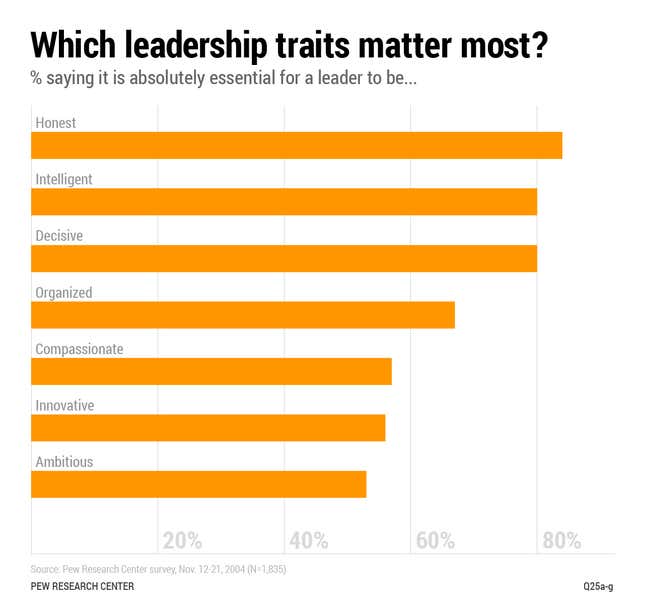A diverse workforce is a major competitive asset. Period. Yet, while research has proven that women are highly effective in top decision making roles, fewer women than men are promoted into these types of senior-level positions. Relying on data in hiring and promotion decisions could even the playing field by helping to remove subjectivity and bias. It helps ensure that the best people are leading—regardless of gender, race, age or any other identifying factor—which is a win all around.
But what constitutes a strong leader? A noteworthy study1 first published in Harvard Business Review paints a compelling picture of strong leaders and the traits that define them. For this study, direct reports assessed the effectiveness of their managers—both men and women—across 16 attributes associated with outstanding leadership, such as “takes initiative,” “self-development,” “displays high integrity and honesty,” and “drives results.” These attributes were selected based on 30 years of research that shows these are the “most important to overall leadership effectiveness.” Simply put: these traits are closely associated with effective leadership.
Leading with EQ
In addition to those traits, a higher degree of emotional intelligence2 is increasingly differentiating the best managers. As such, management roles now call for high EQ.3 It makes intuitive sense: leaders with strong emotional intelligence tend to inspire their teams. And women in particular excel when it comes to emotional intelligence: Research shows4 that women demonstrate empathy and are seen by employees as compassionate and honest.5
It’s perhaps unsurprising, then, that women also show strong performance in areas like mentoring, inspirational leadership, conflict management, and teamwork. Those strengths align with overall desired leadership traits: EQ is an important part of leadership performance in addition to traditional hard skills, such as expertise and business results. This data is a good reminder to hiring managers, and anyone looking to acquire top talent, that women are proven to have the traits needed to be the kind of leaders that employees want, and that employers are looking for.6

Though “soft skills” may sound ambiguous, emotional intelligence can actually be studied and quantified in concrete ways. This makes it more easily incorporated into the hiring process. These skills even come packaged in finite terms: a person’s EQ is based on how they handle 19 competencies across the four areas of self-awareness, self-management, social awareness, and relationship management. This solidifies their place alongside the standard talent measures that look at business results and expertise.
Meaning in measurement
Because emotional skills are now being reliably examined, quantified, and valued, an aspiring CEO or VC partner can point to data that says she’s likely to excel as a leader. The quantification piece is important, as it is with measuring objective performance and business outcomes. As Susan L. Colantuono, CEO of Leading Women, states in her book No Ceiling, No Walls:
It’s no accident that Fortune magazine found that companies with the highest concentration of women at the top are “fanatical” about measurement…they use “empirical standards, clear goals, and frequent reviews to identify and reward high performers.”
Women have demonstrated many times over that they excel when it comes to leading in the workplace. They are ready to ascend to leadership ranks in greater numbers. As we all—men and women alike—rally to battle misguided perceptions, biases, and institutional barriers to support women reaching their full leadership potential, and ascending to leadership ranks in greater numbers, one way through is clear.
Let data—which indicates strong leadership potential for both men and women—speak for itself in hiring and retention decisions. Knowing that both women and men are equipped with the skills to lead, and that they both have the potential to make strong leaders, encourages organizations to use the objectivity of data in hiring for leadership roles. In doing so, there’s a greater likelihood that the strongest leaders will prevail. That kind of leadership is a win for all of us.
This article was produced by Quartz Creative on behalf of JPMorgan Chase and not by the Quartz Editorial staff.
- https://hbr.org/2012/03/a-study-in-leadership-women-do
- https://www.extension.harvard.edu/professional-development/blog/emotional-intelligence-no-soft-skill
- https://www.theguardian.com/careers/2015/aug/20/emotional-intelligence-why-managers-should-show-a-softer-side
- https://www.kornferry.com/press/new-research-shows-women-are-better-at-using-soft-skills-crucial-for-effective-leadership
- https://www.pewsocialtrends.org/2008/08/25/men-or-women-whos-the-better-leader
- https://www.pewsocialtrends.org/2015/01/14/chapter-2-what-makes-a-good-leader-and-does-gender-matter
